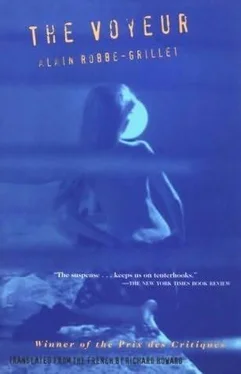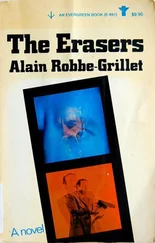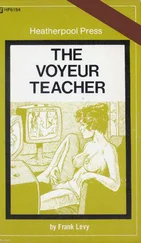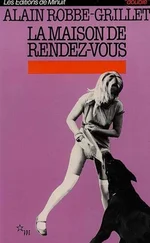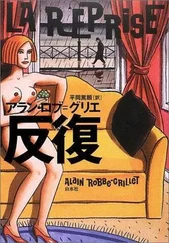He wondered if they used handcuffs on the island, and how long the chain linking the two rings would be. On the right side of the memorandum book were listed amounts received, as well as descriptions of articles sold. This part, at least, had needed no retouching, and showed no flaws, since Mathias had recovered possession of the wrist watch given away the day before. He decided to finish the account of this unjustified day: at the top of Wednesday’s page he wrote two words, pressing hard on the pencil: “slept well.”
On Thursday’s page—still blank—he wrote in advance the same remark. Then he closed the black book.
He set the oil lamp on the pedestal table at the head of his bed, undressed, piling his clothes on the chair, put on the nightshirt his landlady had lent him, wound his watch and laid it near the lamp base, lowered the wick a little, and blew into the top of the chimney.
While he was groping for the open side of the bedsheets, he remembered the electric light. When the latter had suddenly gone out he had flicked the switch back and forth several times, supposing that the circuit was in bad working order. But the light had not come back on despite all his manipulations, and soon the landlady was knocking at his door (with her foot?), holding a lighted oil lamp in each hand. The “local breakdowns,” she said, were very frequent and sometimes lasted a long time; the islanders had therefore retained their old oil lamps, which they kept ready for use as in the past.
“It wasn’t worth making all that fuss about progress,” the woman had concluded, carrying away only one of her two lamps.
Mathias did not know in which position he had left the switch. If it was “off,” then the current might have been reestablished for some time now without his knowing it; and on the other hand, the light might suddenly go on in the middle of the night. He reached the door in the darkness, his hands recognizing as he passed them the chair with his clothes on it and the marble top of the big commode.
He flicked the switch near the door. There was still no current. Mathias tried to remember which position was “off,” but could not, and pressed the little metallic ball for a last time, just in case.
Groping his way back to bed, he slipped between the sheets which seemed cold and damp. He stretched out on his back at full length, legs together, arms crossed over his chest. His left hand bumped into the wall. The outlines of the window on his right began to emerge from the darkness—a vague, dark blue gleam.
It was only then that the salesman realized how tired he was—overcome by an immense fatigue. The last mile or so, taken at a fast pace in the dark from Black Rocks to town had exhausted his strength. At dinner he had scarcely touched the food the proprietor had served him; fortunately the latter did not speak to him once. Mathias had hurried through the meal in order to return to his room—the back room with the high, dark furniture—looking out onto the moor.
Thus he was alone again in this room where he had spent his whole childhood—with the exception, of course, of his first years following his mother’s death, which had occurred shortly after his birth. His father had remarried soon after, and had immediately taken Mathias back from his aunt, who had intended to bring him up as her own son. The child, adopted quite naturally by the new bride, had spent a long time wondering which of the two women was his mother; it had taken him still longer to understand that he had no mother at all. He had often heard the story before.
He wondered if the big corner cupboard, between the door and the window, was still locked. That was where he had kept his string collection. It was all over now. He did not even know where the house was anymore.
At the foot of the bed, on the chair with its back against the wall (where a horizontal streak had been worn into the wallpaper ), sat Violet, a timorous expression on her face. The childish chin was pressed against the rail of the wooden bed, around which her little hands were clasped. Behind her was another cupboard, a third one on the right, then the dressing table, two other chairs different in design from each other, and finally the window. He was alone again in this room where he had spent his whole life, looking through the curtainless panes of the small, square window set deep in the wall. It looked out over the moor, with no courtyard or even the least bit of a garden intervening. Twenty yards from the house stood a big wooden fence post—the remains of something, no doubt; on its rounded extremity was perched a sea gull.
The sky was gray and the wind came in strong gusts. Yet the gull remained completely motionless on its perch. It could have been there a long time; Mathias had not seen it come.
Its head was facing toward the right, in profile. It was a big whitish bird with no dark patch on its head; its wings were of a darker color, though they looked dusty: it was a common species.
It is a big gray and white bird; its head has no dark patch. Only the wings and tail have any color. It is the type of sea gull most common in the vicinity.
Mathias has not seen it come. It must have been there a long time, motionless on its perch.
Its head is facing toward the right, in profile. The points of the long, folded wings cross over the tail, which is rather short. The beak is horizontal, thick, yellow, slightly curved, but strongly hooked at the tip. Darker feathers border the lower edge of the wing as well as its sharp tip.
The right leg (the only one visible, the left being directly behind it ) is a thin vertical stem covered with yellow scales. It begins, under the belly, with a joint attached at an angle of one hundred twenty degrees, connecting at one end with the fleshy, feathered part just the beginning of which can be distinguished. At the other end of the leg can be seen the webbing between the toes and the pointed claws spread out on the rounded extremity of the fence post.
From this post is hung the wicket-gate connecting the moor with the garden, which is surrounded by a barbed-wire fence attached to wooden posts. The garden, carefully laid out in parallel beds separated by well-kept lanes, is a profusion of many-colored blossoms sparkling in the sunshine.
Mathias opens his eyes. He is in his bed, lying on his back. In the half-consciousness of waking, the bright (but vague)
image of the window, now on his left, begins to move around the room with an irresistible although uniform movement, as steady and deliberate as the current of a river, appearing successively at the places which should be occupied by the chair at the foot of the bed, the cupboard, the second cupboard, the dressing table, the two chairs side by side. Then the window stops at Mathias’ right—at the place it occupied yesterday—four identical panes divided by a dark cross.
It is broad daylight. Mathias has slept well, not waking once, not moving an inch. He feels rested, calm. He turns his head toward the window.
It is raining outside. The sun was shining in his dream. He suddenly remembers it for a second, after which it immediately disappears.
It is raining outside. The four panes are spattered with tiny brilliant drops forming oblique—although parallel—lines less than half an inch long, cross-hatching the window’s whole surface in the direction of one of its diagonals. The almost imperceptible sound of the raindrops against the glass is audible.
The lines occur closer and closer together. Soon the fusion of the drops with one another disturbs the well-ordered pattern. The shower was just beginning when Mathias turned his eyes toward the window. Now big drops are forming everywhere, streaming along the glass from top to bottom.
Threads of water cover the whole image, their direction generally vertical, a series of winding lines occurring at regular intervals of about three-eighths of an inch.
Читать дальше
